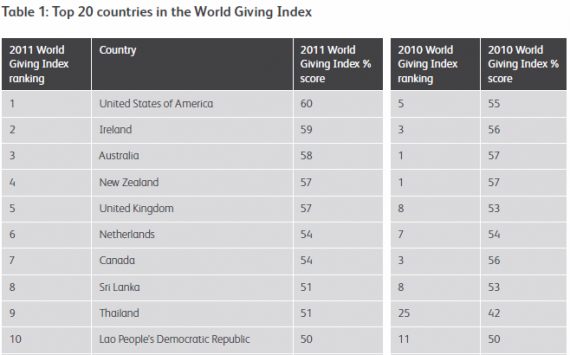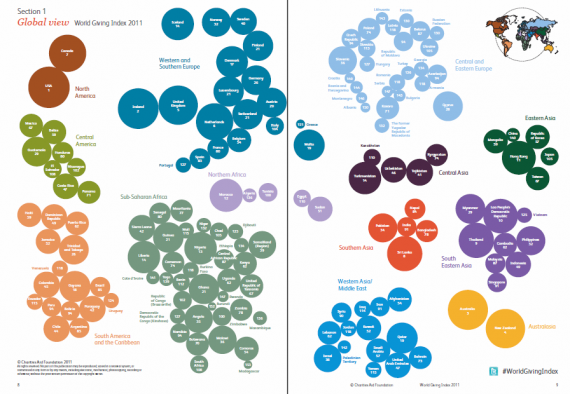USA World’s Most Charitable Nation
The United States tops the world in giving money, volunteering time, and helping strangers.
Commenting on yesterday morning’s post ”USA Still a Christian Nation,” which passed along a Gallup finding that “78% of American adults identify with some form of Christian religion,” Commonist snarked, “No wonder concern for the poor, infirm and unfortunate is the norm in the US. Especially when it comes to the more religiously inclined political party.”
My off-the-cuff retort, “Actually, the level of concern about the unfortunate is high, indeed, in the United States. It just manifests in charitable giving-including via churches-rather than in generous government-provided benefits,” was based on fuzzy recollections of various surveys over the years. Via Paul Caron (“World Giving Index 2011: U.S. Is #1 (Out of 153 Countries)”), I’ve now got fresh data to buttress that claim.
The Charities Aid Foundation, a British “charity dedicated to getting the best for other charities and their donors” which claims “For over 80 years, we have found the most effective and efficient ways to connect donors to the causes that matter to them and for money to get where it’s needed,” has conducted a new study on the subject:
This is the second edition of the ‘World Giving Index’, the largest study into charitable behaviour across the globe involving 153 countries in total.
Using data from Gallup’s Worldview World Poll, the report is based on three measures of giving behaviour – giving money, volunteering time and helping a stranger.
The results show that the USA is officially the most charitable nation in the world, moving from fifth place last year to first place this year. Ireland is the second most charitable country and Australia the third.Overall the World Giving Index, demonstrates that the world has become a more charitable place over the last 12 months – with a 2% increase in the global population ‘helping a stranger’ and a 1% increase in people volunteering.
We’ve moved up incrementally since the 2010 report:
The Anglosphere dominates the list, with the USA, Ireland, Australia, New Zealand, the UK, and Canada all making the top 10.
This chart, on pages 8 and 9 of the report, breaks it down by geographic region:
You can read the report for yourself and see if you agree with the ranking methodology. But all of the surveys of this type that I’ve seen put the United States at or near the top.
My hunch is that it has little to do with our religiosity–after all, several of the other top countries are much less religious–and more to do with cultural and societal norms. We give more privately precisely because we don’t have as generous a government safety net as most developed nations. I don’t know enough about the subject matter to have a meaningful opinion on the relative advantages of public and private funding for helping the less fortunate.








We might start thinking about an Eirosphere. I note that six of the top ten in giving have sizeable Irish populations (there are ten times as many people in the U. S. of Irish descent as there are people in Ireland period).
I’m pleasantly surprised. Three decades of bombardment by Randian-Nietzchean propaganda haven’t driven the humanity out of our country after all.
+1 Dave Schuler. 🙂
Also,
Regarding that whole “Anglosphere” thingie… We’re working on that. 😉
That might be true. There may be a “I gave at the office” mentality in other developed countries. But I think it is just because that the US is simply a wealthier nation.
Cheers.
It is good to know the methodology.
“Giving money or time to an organisation could include political parties/organisations as well as registered charities, community organisations, and places of worship.”
I am not sure that donating to Obama/Gingrich or my favorite think tank is especially charitable, in the more positive sense. Also, note the report states that giving of money has decreased. I also think that donating to your own church should be seen as mixed in motivation for most people.
All that aside, I would still bet on the Anglosphere (Eirosphere for Dave) leading since it is a longstanding cultural tradition. Ben’s snark aside, I think people intuitively grasp the incompleteness of Objectivism.
Steve
It could also be seen as a function of trust in a society. Greece is one of the least charitable countries in Europe. It also a country where cheating on taxes is seen as acceptable and wide-spread.
If people are willing to cheat everyone who is not a member of their clan, then they will not donate to charity. As the U.S. becomes more clannish, I wonder if charitable giving is go down and government entitlements will go up.
I have long had a question about these types of metrics and it is this: how much of the church-based giving that it counted here is given to maintain the specific churches? If these studies count all giving to churches, then a lot of the giving (the large majority) is going to run the church.
I say this as a regular church attender who is aware of the budgets of the churches I have attended, and most of the weekly giving goes to pay the mortgage, pay the staff, etc.
Now, this is not to say that the churches in question do not, also, engage in charitable spending in the community/the wide world. For example, my church has funded the drilling of fresh water wells in dozens of villages in Zambia, has restored homes in poor neighborhoods of Montgomery to help poor families, and any number of other things. However, I have to wonder, if we are measuring charitable giving, should all the money given to my church count (again, the money that goes to pay for the aforementioned salaries (we have a large staff), our very, very nice building, the ever-changing decorations in the sanctuary, the various social events for the kids, etc) as “charitable giving” or should only the parts spent on actual charitable activities count?
I ask this not to critique my church, religion in general, the US, etc. It is a methodological question in terms of understanding what these numbers mean (and do they mean similar things in other countries being surveyed?).
@steve:
This, too, makes me wonder about the numbers.
First, many countries have public financing of campaigns.
Second, we spend remarkable amounts of cash on campaigns, so that would have to inflate the numbers in the US’ favor, yes?
I’ll add to Steven’s questions with this: how much charitable giving is self-serving society posturing? Giving 10k to your symphony so that your name will appear on a plaque positioned slightly higher than the name of your neighbor isn’t exactly bathing the feet of the poor.
There’s also quite a bit of charitable giving to private schools in what amounts to deferred tuition. My daughter’s school simply informs us that we are expected to give them two grand. On top of absurdly high tuition. A lot of people are giving to “charity” because the school system sucks.
Since most comments about the ranking has been about money, it should be noted that the score isn’t just about money, countries also gets points from “volunteering time” and “helping a stranger”. In the giving money category the US ends up at number 10.
Ireland, Australia, New Zealand, the UK, Netherlands, and Canada (places 2-7) all both pay higher taxes and have better safety nets, I’m not sure they should be ranked lower than the US. Unless you think that only the money you give directly should be counted and not the money distributed through higher taxes.
@PJ: I’m open to persuasion that high levels of public benefits are an indicator of a generous society. But I’m not aware of a definition of charity that includes coercion. That is, I have a choice whether to give money to a church or a charity. I have no choice as to whether to pay may taxes.
Counting giving to something or someone that gives you something back in return for your “gift” as charity seems like a dubious calculation.
Using that definition, isn’t every financial transaction “charity?”
The reason why we have taxes as undersupporting our admittedly frayed social support system rather than charity is that charity doesn’t work very well. Look at history if you want to see if a charitable support system can work in lieu of taxes. It didn’t do that great a job in medieval Europe, and that was with the Church nagging all the way.
And would the rest of you who hate to pay taxes just shut the eff up and move to a country that doesn’t have them, already? If it’s that important to you, just pack everything up and MOVE. I have no sympathy for people who use all the commonwealth benefits provided by taxation while whining all the time about how much they have to pay. Reminds me of that dingbat who howled when the county voted, because of lack of road taxes, to let the road in front of her house revert back to an unpaved road. She didn’t want to pay taxes, but she felt she had the Constitutional right to have a paved road in front of her house. She couldn’t see why the salaries of all the public servants in the county couldn’t be truncated to provide the extra funds needed for HER road.
@grumpy realist:
Wouldn;t it be easier for those who want a scandanavian welfare system to move to a northern European country in order to take advantage.
All of the high tax, high benefit countries are small, homogenous, and zero growth.
Progressives have to choose between high tax and high benefits along with zero population growth and no immigration or those progressives can choose open borders, unlimited immigration, and a libertarian view of social services.
The problem is that progressives believe that they can have the social services of Finland while having the population of Mexico.
@SD-
Charts. Include GDP growth per capita. Those countries are not much different than we are.
http://stateofworkingamerica.org/subjects/international/
Steve
@superdestroyer:
Gosh, that’s a good point. Homogeneity = zero growth. Thank goodness we have robust immigration and an ethnically diverse population, eh?
@James Joyner: But you have a choice as to whether to vote for the candidate who advocates a strong social safety net to help the less fortunate, versus the candidate who advocates cutting such programs to finance tax cuts. The United States still has a great deal of social safety net, in part because of the institutional momentum of the post-FDR decades when Americans voted for the former candidate (including Republican candidates). If we were starting from scratch with today’s electorate, I don’t think we’d ever rebuild the social safety net we have now. That’s a generalized measure of charitableness, in my mind.
And out of the money given to a church that actually ends up being used for real charity, what percentage of that charity is given to members of that specific church that are in a tough spot? What percentage is given to people who are not a member of any church? If we move to an all-charity method of social safety net, what happens to the atheists who are in a tough spot? Are they just screwed?
The USA also has had large amount of donations being provided in conjunction with networking and fraternal groups such as The Rotary, Kiwanas, Masonic Shrine (look at their Children’s Hospitals!) , IOOF, Knights of Colunbus, Knghts of Pythias (look them up, interesting Abe Lincoln link). All these groups provide significant donations with little overhead, while many so-called charities are bureaucratic organizations.
Then there are the volunteer groups such as the volunteer fire departments, search and rescue, civil air patrol……
A decade ago I worked on a NATO Partnership-for-Peace project with former Soviet-bloc countries that included the idea of, well, “good-old-boys” (or girls) volunteer countries that included the idea of, well, “good-old-boys” (or girls) volunteer clubs for infrequently needed emergency services. They had no tradition of volunteerism (forced volunteerism to harvest crops notwithstanding). To them if the government doesn’t provide, it doesn’t happen. [International Rotary assisted in out program.]
Or, we have a social safety net precisely because we have a culture of charitable giving.
@superdestroyer:
Well said!
So the solution is of course to break down the clannish mentality and be more welcoming of other ethnic groups.
Well, if you are going to look at overhead for churches then you need to look at the overhead of other “charities” many of which spend a large percentage of what they take in in “administration”. For such things like, salaries for their senior officers that exceed most for-profit CEO salaries and I dare say pastors of churches. (before you go off on that, realize there are far more corporations with low-paid CEOs than you imagine as opposed to the large corporate CEOs everyone is always carrying on about)
It is kind of funny that a premium would be put on ‘money’ giving as opposed to giving the far more precious donation of time and effort. But most “charities’ want money since you can’t pay high salaries with someone’s donated time. Plus, if you donate time you are far more likely to maintain an awareness of the activities and efforts of the charity in a very personal form of oversight.